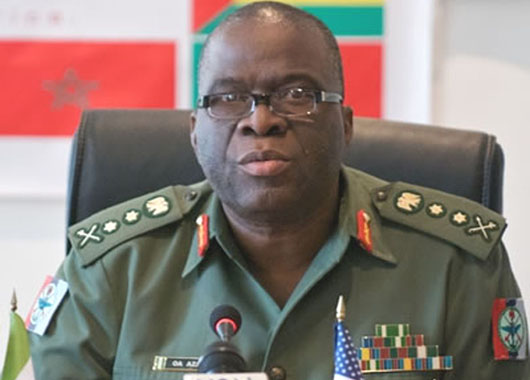by WorldTribune Staff, October 30, 2017
The United States would not have needed troops in Niger had then-Secretary of State Hillary Clinton and the Obama administration helped to cut off the terrorist threat in that country when they had the chance, a foreign policy analyst with direct knowledge of the situation wrote.
“American troops are in Niger because the U.S. didn’t listen to a wise African leader who wanted to stomp out regional jihadists before they became a real problem,” J. Michael Waller wrote in an Oct. 27 op-ed for The Daily Caller.

That African leader, Nigerian intelligence chief Owoye Andrew Azazi, had alerted the Obama administration to the threat of jihadist groups, led by Boko Haram, in Niger.
But “Washington wasn’t listening,” Waller wrote, because “Clinton didn’t see Boko Haram as a threat.”
Azazi had “developed a workable, proven plan to prevent jihadist networks in the region from taking root,” Waller wrote. “I know because I worked with General Azazi at the time.”
From 2010 to 2012, Azazi “tried to develop relations with the Obama administration to build what he called ‘a strategic security relationship’ with the United States,” Waller wrote. “He saw the new jihadist violence of Boko Haram as a threat not only to his country, but to the region and beyond.”
Waller continued: “In September, 2011, I sat with Azazi in his Abuja office as we watched the Moammar Gadhafi regime in Libya disintegrate. The U.S. led a coalition to topple Gadhafi. It pushed a bizarre plan to replace what was left of Gadhafi’s anti-jihadist forces with jihadist groups, including the Muslim Brotherhood, backed by the terrorist sponsoring regime in Qatar. A month later, Gadhafi died a gruesome and humiliating death.
“Reviewing initial reports of the spillovers of Gadhafi loyalists and jihadists into Niger, Azazi saw where the region was headed. He named individual terrorist leaders from a list and said, ‘I can send squads into Niger and grab them. We know where they’re hiding. But they aren’t Nigerian citizens. We can get them, but we’ll need some backing from Washington.’ ”
In a Jan. 4, 2012 op-ed for The Washington Times, Azazi wrote: “We can destroy Boko Haram in its early stages, before it goes truly international. We don’t want or need American troops. But we would benefit greatly from American know-how and other forms of support as we develop our new counterterrorism strategy. We have much to offer through our own expertise, human resources and experience.”
“Those who fail to understand the enemy threat doctrine will fail to see the danger until it is too late,” Azazi warned. “The State Department,” he noted, “has yet to designate Boko Haram as a terrorist organization.”
Azazi wrote that “Nigeria can defend its interests without U.S. support. But the United States cannot well defend its homeland from Boko Haram and other threats without Nigeria. We welcome a mutually beneficial partnership with the U.S. against terrorists like Boko Haram while there is still time.”
But Washington, Waller noted, “wanted no strategic partnership.”
The Clinton-led effort in Libya then collapsed in Benghazi.
Azazi died in a helicopter crash.
“Without his visionary and firm national security adviser, Nigeria’s feckless president Goodluck Jonathan let the Azazi plan fall apart,” Waller wrote. “Boko Haram exploded, kidnapping more than 200 girls and terrorizing the country.”
After Clinton resigned as secretary of state in early 2013, her successor John Kerry designated Boko Haram as a terrorist group.
“By then, the jihadist threat had spread just as Azazi had warned,” Waller wrote. “Soon, Al Qaida and Islamic State (ISIS) terrorists would plague the area, with Boko Haram alternating its allegiance between the two.”
The Obama administration “took a problem it could have helped Nigeria prevent, and turned it into a multi-country military expedition,” Waller wrote. “A U.S. contingent quietly grew in Chad, with an effective local military partner. Obama sent U.S. troops into Niger to support French operations against jihadists in Mali, to the west, originally to operate and protect a drone base, and then to help fight Boko Haram on Nigeria’s northern front. Obama then dispatched hundreds more to Cameroon, to help fight Boko Haram on Nigeria’s east.
“As with any mission creep, the U.S. military presence in Niger grew and grew, until the force reached about 675 by the time Donald Trump became president. The Obama strategy remains in place. Now, instead of the Azazi plan, American troops are part of the fight against Boko Haram, Al Qaida, ISIS, and other jihadists in Niger.
“Initial reports say that the jihadist group that ambushed the American soldiers last month came from among the tribes that populate both sides of the Niger-Nigeria border. Those are the same tribes that General Azazi had networked successfully. The loss of four Americans, some reports say, was due to ‘intelligence failure.’ The far greater failure was to take Azazi’s proposal seriously.”
Subscribe to Geostrategy-Direct __________ Support Free Press Foundation
